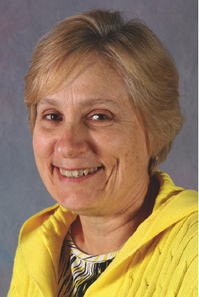A longtime professor with the USD Sanford School of Medicine has been named to a new leadership role.
Robin Miskimins, Ph.D., was named associate dean for research at the school on July 1, and she couldn’t be more excited.
“It’s something that I really was looking forward to,” she said. “It gives me an opportunity to do a lot more for the school, I hope, in terms of helping them develop their research program.”
As associate dean, Miskimins said she will aid the faculty by helping them find funding opportunities, networking and identifying collaborators.
In addition, she will work with medical students “to make sure they get some exposure to scholarly activity and research, and be able to pursue their interests.”
“It also goes as far as the residents and clinical faculty that have interests in helping them develop those, and teaching them things they may not know, giving them training opportunities, helping them publish, identifying where that might be, how to write, how to do scholarly activity,” she added. “Some of them have a lot of interest, but not much experience, so using my experience to help guide them to do the things that they would really like to do.”
In addition, Miskimins will be charged with increasing SSOM’s externally funded research, enhancing the school’s academic profile and building collaborative relationships with a variety of partners.
“With her outstanding talents, extensive research background and strong interpersonal skills, Dr. Miskimins will help us continue to advance our institutional goals,” said Mary Nettleman, M.D., M.S., M.A.C.P., dean of the Sanford School of Medicine and vice president for health affairs at USD, via a press release.
Miskimins has been at USD for the past 22 years. She began as an assistant professor, and became an associate professor, and a full professor of basic biomedical sciences, a role she still holds.
“About four years ago I became the director of faculty and research development, which started out within the division of basic sciences in the school of medicine and then expanded to all health affairs, which means it included the school of health sciences,” she said.
Miskimins earned her Ph.D. in molecular biology from the University of Arizona in 1983, her M.S. in genetics from Arizona in 1978 and her B.A. in molecular and cellular developmental biology from the University of Colorado in 1976.
Her research interests include development of myelin in the central nervous system, as well as the relationship of myelin to disease states such as multiple sclerosis and schizophrenia.
She is the recipient of several academic honors, including the 2007 Chester McVay Award presented by the University of South Dakota School of Medicine and the 1999 Board Of Regents Award for Excellence in Research.
When she is not working, her hobbies include woodworking, birding, gardening, golfing and photography.
“I don’t have any trouble keeping myself occupied,” she said with a laugh.
Miskimins said the aspect of her work that she most enjoys is “the fact that I get to help people do what they are really passionate about.
“For me, that’s the essence of what this is,” she said.



